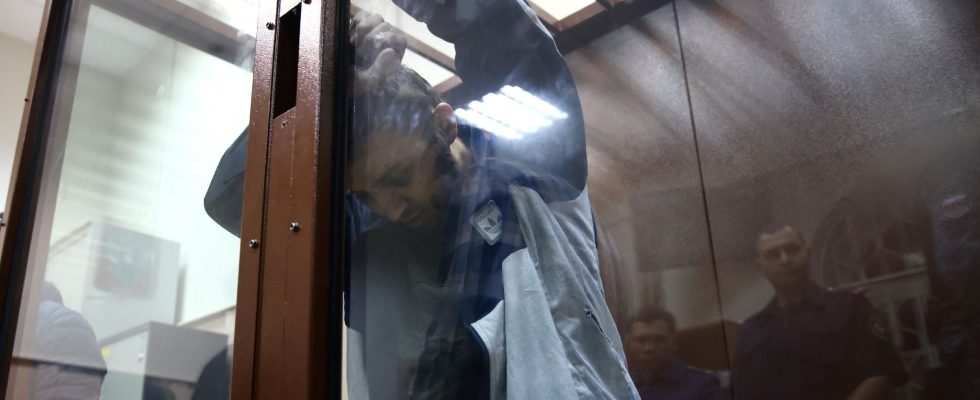The “Crocus” attack on Friday March 22 sent the whole of Russia into turmoil in the face of one of the worst terrorist attacks the country has ever experienced. If the Russian authorities indirectly accuse Ukraine of being responsible for the attack, although claimed by the Islamic State, the first scapegoats seem to be the Central Asian populations living in Russia. Because the main suspects arrested by the police are four citizens from Tajikistan, that we saw on social networks with faces covered in bruises and wild looks during their appearance in a Moscow court, Sunday March 24, after torture sessions by the FSB.
Enough to put these citizens of Central Asia on alert. These former Soviet republics see hundreds of thousands of citizens leave each year for Russia to work, “in very difficult conditions,” explains Marat, a lawyer specializing in the rights of minorities in Russia, preferring to remain anonymous. Many work in the construction sector, in subordinate positions, and are poorly paid. Not to mention the pressure exerted by the authorities against them for two years so that they join the Russian army in Ukraine, and the numerous police raids in these migrant communities.
But this pressure has increased a notch since the Moscow attack. Central Asian diasporas in Russia are now associated with terrorism. The acts Racism towards these communities is skyrocketing, widely relayed by the pro-Kremlin blogging community. “It is necessary to assimilate all members of the diasporas to terrorists. And eliminate them as terrorists,” writes the propagandist Telegram channel Troika. “How about a similar action in a Tajik shopping center?” – adds the channel “Dupi4ok Dizayner”.
Arbitrary detentions and torture
The xenophobic impulse has penetrated Russian society. For example, a shopping center owner in Yekaterinburg required to list the identity of all employees of Central Asian origin, while in several large cities, taxi users refuse to get into a vehicle if its driver is Tajik.
Lawyer specializing in the defense of migrants in Russia Valentina Tchoupik has received “thousands of calls from migrants since the terrorist attack”. “Most say they suffered illegal checks and detentions, and many people were beaten by police and expelled from the country,” she explains. In the first hours after the attack on the shopping center, “the calls most often came from Kyrgyzstan, as security forces raided taxi drivers, where many representatives of that country are located.” The attention of the police and intelligence services then focused on the hostels and dormitories and “complaints from citizens of Tajikistan and Uzbekistan became more frequent,” she said.
“Stay away from public places”
On March 27, 40 Kyrgyz citizens were arrested upon their arrival at Moscow’s Sheremetyevo airport and will be returned to Kyrgyzstan “as soon as possible”, announced the Russian Ministry of Foreign Affairs. His Kyrgyz counterpart has advised his citizens not to travel to Russia at this time. For its part, the Ministry of Employment and Labor Relations of Uzbekistan asked its compatriots in Russia “to always carry their identity documents with them and to stay away from public places.” The same precautionary measures were communicated by the Tajik Embassy in Moscow.
That’s not all. The visa exemption regime for Russia from which Central Asian populations benefit, provided by the Eurasian Economic Union, has been called into question in recent days. In the Duma (lower house of the Russian Parliament), MP Sergei Mironov says he wants to strengthen migration control upon entry into Russia, because “without that”, there would be “no order at the border, which is now vital to regulate migration and counter terrorist attacks,” said the MP.
“Residence conditions for Central Asian migrants are getting tougher and tougher,” notes researcher Temour Oumarov on the site of the Carnegie Foundation for International Peace think tank. New bureaucratic requirements are imposed on them, such as compulsory notification of employment to the Ministry of the Interior or compulsory fingerprinting of Central Asian migrants at Moscow airports.
According to lawyer Marat, “expulsions will be carried out in the coming weeks, which will particularly target Tajiks, without any official document being published. These procedures will remain unofficial”, he anticipates. A provision which would seriously handicap Russia. According to some estimates, the contribution of Central Asian migrant workers to the economy represents 8 to 10% of the country’s GDP. An essential participation, given the labor shortage facing the Russian economy. Despite this, “the fate of Central Asian migrants is not about to improve,” says Marat.
.
